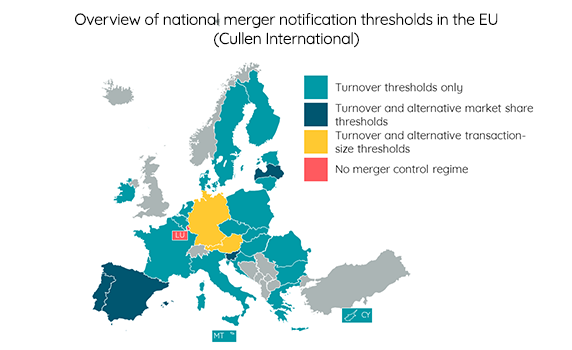The European Commission has exclusive jurisdiction in the European Economic Area (EEA, including the 27 EU member states plus Iceland, Liechtenstein and Norway) to review mergers which have an EU dimension, meaning that they meet certain turnover thresholds.
If a merger does not have an EU dimension, national competition authorities (NCAs) may have jurisdiction over it. That depends on national merger notification thresholds.
Our recently published benchmark, which covers those national thresholds in the 27 EU member states, shows that in April 2022:
- the only EU member state without a merger control regime was Luxembourg, although this may soon change as the Ministry of Economy recently consulted on whether to introduce it;
- all other EU member states required the notification of mergers subject to turnover-based notification thresholds;
- Latvia, Portugal, Slovenia and Spain also used alternative market share thresholds; and
- Austria and Germany also used alternative transaction-size thresholds.

For more information or to access the full benchmark, please click on “Access the full content” - or on “Request Access”, in case you are not subscribed to our European Competition service.
more news
19 December 25
CSRD transposition: Belgium, Denmark, Finland and Slovenia transpose the “stop-the-clock” directive
Cullen International’s updated benchmark tracks the progress made by the 27 EU member states in transposing the CSRD and the related “stop-the-clock” directive.
19 December 25
Global trends in AI regulation
Our latest Global Trends benchmark compares policies and regulations on artificial intelligence (AI) across 14 jurisdictions around the world.
19 December 25
Implementation of European Media Freedom Act: general overview in 12 EU member states
Our new Media benchmark shows if there are initiatives/rules in the selected countries which aim to put into application the EU Media Freedom Act (EMFA). If yes, it describes the scope of the main measures proposed. The benchmark also provides information on the next legislative or regulatory steps.